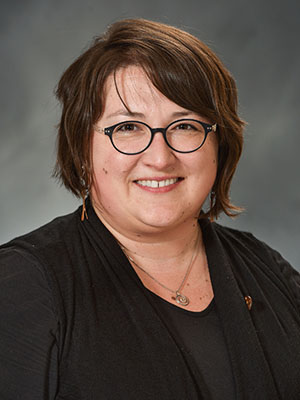JOHNSON CITY (June 25, 2021) — When Dr. Stacey Williams, an East Tennessee State University
psychology professor, began to research the societal experiences of Appalachia’s LGBTQ
community, she was already focused on her own study concerning the social stigmas
encountered by these groups. But when a student expressed greater local interest in
the subject, Williams took a deeper look at LGBTQ life in Appalachia and, today, devotes
much of her time to promoting a better understanding of those regional issues. 
“Once I started, there was no looking back, because there is such a demand for knowledge about this population particularly in this region of the country,” Williams said. “Very little research is being conducted on the lives of LGBTQ individuals in Appalachia, and virtually none on those living in Northeast Tennessee.”
Williams points out that, while everyone experiences stress, the stigma associated with being LGBTQ creates a unique set of issues she and other researchers refer to as “minority stress.”
“Minority stress is the exposure to additional stress that is identity-specific,” added Williams. “This can manifest at multiple levels – the structural level, such as laws or policies that discriminate; the interpersonal level, such as rejection or being unfairly treated by others because of one’s identity; and on a personal level, such as when LGBTQ individuals internalize negative attitudes and turn them toward the self to feel shame.”
Those were the primary motivations for Williams’ research on the psychological well-being of LGBTQ Appalachians, including those who call Northeast Tennessee home. In recent work funded by the National Institutes of Health (NIH), Williams joined forces with researchers from Yale University and the College of the Holy Cross to further study these stresses in South Central Appalachia’s LGBTQ emerging adults.
“We developed an NIH-funded online intervention that involved writing as a means of coping with minority stress,” Williams said. “LGBTQ individuals in the 18-29 age range participated in the intervention which essentially supported the idea that different types of expressive writing can assist sexual minorities in dealing with stress. Importantly, a precursor to the intervention was an initial phase of the study that involved interviews and focus groups with a few emerging adults as well as community stakeholders that worked in various capacities with the LGBTQ community.
“We talked with these folks about the identity-related stressors people in this region encounter, in order for our research team to build the best possible intervention that would be most helpful to those who live around here. In this developmental phase of the project, Dr. Abbey Mann of ETSU’s Family Medicine and I, along with the research team, have uncovered what many of us might expect – that LGBTQ young people are being rejected from family and religious communities. In addition, they described a nuanced experience not really talked about in the scientific research, which is that in this area of the country, LGBTQ don’t have specific spaces where they feel safe. Rather, safety is attached to particular people. In any given setting, you might have some people who are safe and some people who are unsafe. And LGBTQ young people must continually navigate and negotiate safety in their environments. As you can imagine, walking into a room or establishment, it is hard to know who is safe.”
Navigating safety is one reason why programs such as ETSU’s Safe Zone are crucial, added Williams.
“The intent of our Safe Zone program is to educate the faculty, staff and students of ETSU to be allies to the LGBTQ community,” she said. “We quite literally have a website where folks can look to see who on campus has been trained and so they can always locate an ally.”
Williams, along with Dr. Alison Deadman of the Department of Music and Heidi Marsh of Women’s Studies, lead the Safe Zone program and its numerous faculty and staff who facilitate training sessions across campus. The original program was developed by the namesake of the newly established Dr. Patricia Robertson Pride Center.
“Now ETSU has an actual space for LGBTQ individuals, which is here specifically with the intent to contribute to the feelings of safety on campus,” added Williams. Dr. Bethany Novotny directs the new center.
In addition to an ongoing role with Safe Zone as well as various research projects, Williams has also for the past year and a half studied the psychological and social experiences of individuals with polycystic ovary syndrome (PCOS), a condition that primarily affects individuals assigned female at birth, with symptoms that can include irregular or missing menstrual cycles, hirsutism (male-patterned body hair), balding/hair loss, obesity, infertility, insulin resistance, depression and anxiety. It is also a risk factor for diabetes, heart disease and cancer. Yet, not everyone with PCOS identifies their gender as woman, Williams noted.
“The experiences of PCOS in individuals who self-identify their gender as nonbinary, gender fluid, genderqueer, or male are entirely absent from published literature on PCOS. As a result, this subgroup of individuals with PCOS feels even more invisible and unheard by health care providers,” said Williams, who has recently completed 50 interviews with gender-diverse individuals with PCOS and plans to write a book about those findings. Information on this project is forthcoming.
Regarding research of all kinds within the local LGBTQ community, concluded Williams, “I would like to see more faculty and students conducting LGBTQ research and considering other diverse identities. I would encourage anyone with an interest in contributing to ETSU’s LGBTQ research efforts to reach out to me.”
For more information, call 423-439-4615 or email williasl@etsu.edu.